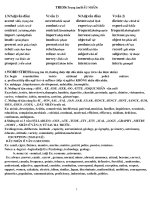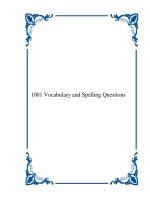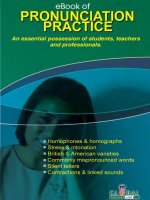012 spelling and pronunciation
Bạn đang xem bản rút gọn của tài liệu. Xem và tải ngay bản đầy đủ của tài liệu tại đây (140.74 KB, 6 trang )
Prof. Francisco Zabala – 2014
Spelling & Pronunciation
1. Basic Vowel Pattern: (Consonant) + Vowel + Consonant
Monosyllabic words that are formed by one vowel letter sandwiched by one or more consonants
generally take a short vowel sound.
<a> = .z.
add
cat
BASIC VOWEL PATTERN: (CC)VC(C)
<e> = .d.
<i> = .H.
<o> = .P.
<u> = .T.
egg
it
on
met
sit
lot
put
<u> = .U.
up
bus
• At the edges:
o Several consonant letters may stand for just one consonant sound
Nick .!mHj.
chop .!sRPo.
knit .!mHs.
puff .!oUe.
o There may be several consonant sounds together
moths .!lPSr.
strong .!rsqPM.
grip .!fqHo.
clan .!jkzm.
• Exceptions: these are normally a small group of common every-day words that got fossilized
in the language. E.g.:
most .!l?Trs.
ghost .!f?Trs.
kind.!j`Hmc.
mind.!l`Hmc.
won’t .!v?Tms.
don’t .!c?Tms.
bath .!a@9S.
can’t .!j@9ms.
2. Ending Modifiers that “make the previous vowel letter say its name”
a. Silent <e>
When silent <e> is added at the end of a one-syllable word that ends in a single consonant, ‘the
vowel letter in the middle tends to say its own name.’
SILENT <-e>
<a> = .z
=
dH.
<e> = .d
=
h9. <i> = .H
=
`H. <o> = .P
=?T. <u> = .T+
U
='i(t9.
cut → cute
hat → hate
pet → Pete
sit → site
hop → hope
duck → duke
• Exceptions: these are normally a small group of common every-day words that got fossilized
in the language. E.g.:
<-ve>
have .g?u+
!gzu.
live .!kHu.
love .!kUu.
<-me>
some .r?l+
!rUl.
come .!jUl.
<-ne>
none .!mUm. gone .!fPm.
Prof. Francisco Zabala – 2014
b. Magic <-y>
When <y> is added at the end of a one-syllable word ending in a single consonant letter, the vowel
in the middle tends to say its own name.
MAGIC <-y>
<a> = .z
=
dH.
<e> = .d
=
h9. <i> = .H
=
`H. <o> = .P
=?T. <u> = .T+
U
='i(t9.
lad → lady
Ken → key
tin → tiny
pot → pony
duck → duty
c. Final <-le>
When <le> is added at the end of a one-syllable word ending in a single consonant letter, the
vowel in the middle tends to say its own name. This does not apply to medial letter <e>.
FINAL <-le>
<a> = .z
=
dH.
<i> = .H
=
`H. <o> = .P
=?T. <u> = .T+
U
='i(t9.
cab → cable
till → tile
pot → pole
run → rule
3. Double consonant letters
Consonant letters are normally doubled to keep a short vowel. In other words, the occurrence of
diphthongs and long vowels tends to be blocked by these double letters. Compare:
write .!q`Hs.
writing .!q`HsHM.
wrote .!q?Ts.
written .!qHsmÿ.
DOUBLE CONSONANTS
Si lent <-e>
Magic <-y>
Final <-l e>
Long
Blocked
Long
Block ed
Long
Blocked
<a> = .z+
dH.
later
latter
lady
daddy
table
apple
<e> = .d+
h9.
Pete
getting
key
Benny
----<i> = .H+
`H.
site
sitting
tiny
tinny
idle
middle
<o> = .P+
?T.
hope
hopping
Toby
dolly
noble
wobble
<u> = .T+
U+
'i(t9.
cute
cutting
duly
dully
mule
juggle
Note: Words ending in <oll> in their base form take .?T.. For example:
poll .!o?Tk.
polling .!o?TkHM.
roll .!q?Tk.
rolling .!q?TkHM.
stroll .!rsq?Tk.
strolling .!rsq?TkHM.
toll .!s?Tk.
tolling .!s?TkHM.
Prof. Francisco Zabala – 2014
4. Internal modifiers
a. Radical <r>
A post-vocalic <r> letter indicates that the vowel sound is longer or more open. This occurs in
monosyllabic words and in the stressed syllable of longer words, too. Final <-re> may also result in
a centring diphthong (i.e. .H?+
d?+
T?.).
<a> = .z
=
@9+
d?.
<e> = .d
=
29+
d?.
<i> = .H
=
29+
`H?.
<o> = .P
=
N9.
<u> = .T+
U
=
29+
T?.
RAD ICAL <r>
Basic Vowel Pattern Monosyllable
cat
cart
gem
germ
fit
firm
pot
port
run
turn
Polysyllable
remark
German
confirm
imported
disturbing
<-re>
care
there
fire
pore
pure
Note: This rule does not work either when the letter is doubled or when it is between two vowel
sounds within the base form.
marry .!lzqh.
sorry .!rPqh.
very .!udqh.
curry .!jUqh.
Paris .!ozqHr.
harry .!gzqh.
berry .!adqh.
mirror .!lHq?.
b. Troublesome <w>
The quality of letters <a, e, o> is distorted when they are followed by <w>.
<a> = .z., <aw> = .N9.
<e> = .d., <ew> = .'i(t9.
<ow> = .`T.
<o> = .P.,
<ow> = .?T.
FI NAL TROUBLESOME <w>
Basic Vowel Pattern
Monosyllable
pat
paw
net
new
cot
cow
cot
flow
Polysyllable
withdraw
renewed
allowed
fellow
The quality of <a> and <o> changes when they are preceded by <w>.
INITIAL TROUBLESOME <w>
Basic Vowel Pattern
Monosyllable
<wa> = .N9.
bad
war
<a> = .z.,
<wa> = .P.
match
watch
<o> = .P., <wo> = .29.
loss
worse
Polysyllable
award
wallet
working
Prof. Francisco Zabala – 2014
5. Two vowels together: “the first says its name”
Although these patterns are highly inconsistent, there is a tendency: when there are two vowel
letters together, many times “the first that came says its name”.
THE FIRST VOWEL LETTER SAYS ITS NAME
Spelling
Examples
<ai> .dH.
Complain rain raid
<ea> .h9.
Bean team reason
<ee> .h9.
See glee feel
<ei> .h9.
Ceiling seize
<ie> .`H.
Replied die
<oa> .?T.
Goat load
<ou> .?T.
Soul shoulder
<ui> .'i(t9.
Fruit nuisance
Common exceptions
<oo> .t9.
Fool moon
<oo> .T.
Good book
<oi, oy> .NH.
Toy boil
<au> .N9.
Daughter fraud
6. Consonants
The relationship between the spelling and pronunciation of consonants is much more
straightforward than the behaviour of vowels.
a. The following letters always stand for the same phoneme, even if they are doubled:
• <b, bb> .a.: Ben, lab, bobby, pebble
• <d, dd> .c.: Dan, daddy, fuddy-duddy
• <f, ff> .e.: Frank, cufflinks, puff
• <h> .g.: hand, heart, hard
• <j> .cY.: jam, major, juice
• <k> .j.: kit, bike, Nike
• <l, ll> .k.: lot, ball, allotted, rolling
• <m, mm> .l.: more, humble, from, immediate
• <n, nn> .m.: nice, then, thinner, beginning
• <v, vv> .u.: vice, Eve, savvy
• <z, zz> .y.: zoo, zebra, buzzing, fizzy
b.
c. <sh> .R.: she, show, marsh
d. <ch>
• .sR.: chin, much, arch
• .j.: architect, character, headache
• .R.: chef, champagne, Chicago
e. <gh>
• Silent: high, weigh, eight, night
• .e.: enough, rough, cough
Prof. Francisco Zabala – 2014
f.
<th>
•
•
.S.
o
o
Words ending in <-th>: bath, cloth, math (BUT with)
Most content words beginning in <th->: theme, theatre, throw
o
Grammar words beginning with <th->: they, this, that, etc (BUT
though)
Content words ending in <-the(r)>: bathe, breathe, bother
.C.
o
g. <c>
•
•
•
•
•
.j. <c> + consonant: act, buckle, mediocre
.j. <c> + <a, o, u>: camera, cut, come
.r. <c> + <e, i, y>: cinema, century, cycle
.jr. <cc>: accident, success
.R.<-cious, -cial>: delicious, precious, special, glacial
h. <g>
•
•
.f. <ga, go, gu>, <gg>: gate, go, gun, bigger, leggings
.cY. <ge, gi, gy>: gem, engine, gym (BUT girl, get, give, begin, tiger,
finger, etc.)
i. <qu> is generally:
• .jv. at the beginning or middle of a word: question, square, liquid
• .j. in “silent <-e> endings” <-que>: antique, unique
j. <s> is very unstable. See “.r. or .y.? The eternal nightmare!” in the set of notes.
k. <t>
• .s. generally: lot, talk, bottom
• .sR?.
in the ending <-ture>: picture, future, torture
• .R. in the endings <-tious, -tion, -tial>: ambitious, information, initial
l. <x>
• .jr. + unstressed vowel: Mexico, maximum
• .jr. + consonant or final: extra, excellent, sex, mix
• .fy. + stressed vowel: exam, exist
• .y. when initial in the word: xenophobic, Xavier, Xerox
m. <y>
• .i. at the beginning of a word: yes, young, yacht
• .H. internally in a word: gym, myth, rhythm
• At the end of words:
o .h. in final unstressed position: city, busy, family
o .`H. in monosyllables: my, sty, fly, why, try
o .`H. under the effect of silent <-e> or radical <r>: rhyme, type, tyre
o .`H. when stressed: July, apply, deny
o .`H. in the ending <-fy>: justify, clarify, modify
Adapted from:
Fitzpatrick, F. (1995) A teacher’s guide to practical pronunciation. London: Prentice Hall
Prof. Francisco Zabala – 2014
Basic Vowel Pattern (C)(C) V C (C) (C)
Short vowel
sound
Mends .!'l(dm'cy(.
Double consonants
Latter .z.
(Cf. Later .dH.)
Silent <-e>
Vowel says its
name
Tendencies
Pete .h9. (Cf. pet .d.)
Magic <y>
Tony .?T. (Cf. Johnny .P.)
Two vowel letters
rain .dH., team .h9., goat .?T.
Radical <r>
cart .@9.
(Cf. cat .z.)
he .gh'9(.
(Cf. here .H?.)
Exceptions
Fossilized & frequent words
(e.g. have, come, love)









